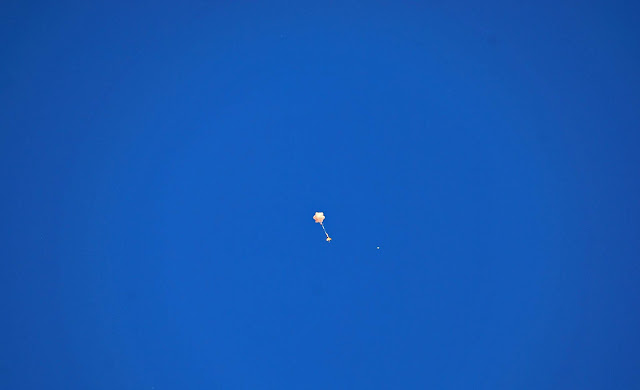During the three-day workshop, they built bottle rockets, balloon racers, and then rockets ready for launch on Thursday, the last day of the session.
Annabelle can tell you more about it. ...
Last week, I took part in a 3-day rocket club at The Museum of Flight. The club focused on teaching middle and high school-aged girls about how rockets work, why we use them, and what we can do with them. The class started by making simple, 2-liter bottle rockets powered with air and eventually lead up to real model rockets.
Our first day was an introduction to working in teams, where we were supplied soda bottles, cardboard, and paper and tasked to create a bottle rocket. The rockets ended up flying around 40 feet in the air when launched using air pressure, a few even getting stuck on the museum’s roof. Though it was a windy day, most of the rockets survived and we were able to recover them to do multiple flights.
On the second day, we learned a lot about how rockets work and their purposes. It turns out rockets started when the Chinese used gunpowder to fire multiple arrows at once as a weapon, which soon evolved into fireworks. Rockets were used as nothing but weapons before we even considered using them for flight – which occurred when a Chinese man attempted firing 46 fire arrow packs attached to his chair. Needless to say, he didn’t survive.
The final day was mostly encompassed of finishing our actual model rockets and designing 3D-printed payloads for them. My team decided to place a small astronaut inside the nosecone, protected by a layer of tape. We ended up making two flights with the rocket at a local raceway in 90 degree heat. Although we were miserably hot, the rocket came down fully intact both times and we were able to take souvenirs from the experience home!Above, Annabelle and her friend load rockets onto the launch pad. Their rocket is in the first position, below.
Ready for lift off!
Mission Control looked like this. :)
The countdown's on!
Their rocket shot skyward swiftly!And then it promptly began its descent, under parachute.
Can you see it falling against the backdrop of the evergreens?
On site, they had help from a super experience model rocket launcher. He shared info during the event, including a cut away of how a model rocket engine is constructed.
HEY, NEIGHBORS!: Thanks to multiple posts all over the Internet yesterday (7/20/2018), we learned that our neighbor Mars is making a close call right now. We had to go outside and check it out.
Last night, Mars was closer to Earth than it has been in 15 years, and the Red Planet won't be as close again until 2035. We also waved at our other solar system neighbors, Saturn, Jupiter and Venus, all visible in our night sky a little after 10 p.m.
COLLEGE TALK: Increasingly, we have been talking about college and what that might look like for CJ and Annabelle.
Obviously, our educational path at MPA is pretty non-traditional, so we need to learn what this will look like/how it will affect the process of applying to colleges.
Today, I listened to a podcast from the HSLDA ( Home School Legal Defense Association) about homeschoolers applying to college. (https://hslda.org/content/podcast/#episode14)
The host and guest talked about everything from creating a homeschool high school transcript, to college scholarships. One of the things they noted was that that you shouldn't wait until your senior year of high school to apply for scholarships, as many are many that are available to younger students. That immediately sent me off to the Google, where I used "high school sophomore college scholarships." That took me to a longish list on scholarships.com. It's definitely something we need to start studying!













No comments:
Post a Comment